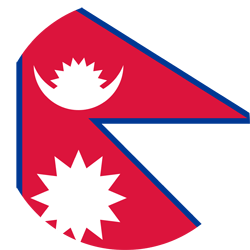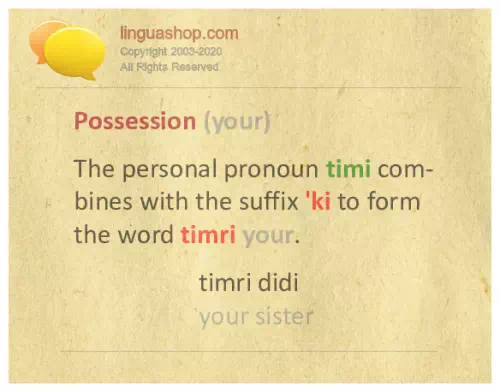
Learn Nepali in just 2 to 4 weeks!
Learn Nepali the easy, fun and fast way. Whether you're a complete beginner or you already know a few phrases in Nepali, you'll be amazed at just how quickly you learn!

Learn Nepali the easy, fun and fast way. Whether you're a complete beginner or you already know a few phrases in Nepali, you'll be amazed at just how quickly you learn!
A personal pronoun is what we call the English words 'I', 'you', 'he', 'she', 'we' and 'they'. The Nepali words for 'you' are 'tapai-haru' and 'timi-haru'. The word 'tapai-haru' is the so-called familiar form. It can be used with friends and family and people you know well. The word 'timi-haru' is the so-called polite form. It is used with strangers and people in a position of importance.

Nepali is spoken by roughly 14 million people. Many people say that Nepali is a difficult language to learn. 'TeachMe! Nepali' makes learning Nepali easy.
Full PDFLearn to get by in Nepali with these useful words and phrases. The phrases below will help you to greet people in Nepali, introduce yourself in Nepali and even hold a conversation in Nepali after you have met someone.


Make the most of your trip to work by learning Nepali words and phrases on the way. With this audio CD, you'll learn 1000's of Nepali words & phrases in a very short time. The voice is in both Nepali and English. Just listen, absorb and enjoy! We are one of the few companies in the world offering a learn Nepali audio cd. If you have a CD player at home or in your car, this is the Nepali course for you.
Add to cartTell me more
You can go from beginner to fluent in Nepali in a short time and our nine-step Nepali learning guide will show you how. You'll learn Nepali greetings, nouns, adjectives and verbs. The guide provides an overview of each step in the progression of skills needed to learn to speak, read and understand Nepali.
There are dozens of greetings that you can learn in Nepali. Imagine, however, just how much effort it would take to learn them all. And learning all of them would also take a lot of time. It would be far better to focus on just three Nepali greetings to get started. For example, learn Namastē, Ramro sanga kanus and Pači betõ la (hello, good-bye, see you later). Learn these three Nepali greetings Namastē, Ramro sanga kanus and Pači betõ la by heart, learn to say them properly and then move on to Step 2 (Nepali pronouns).

These Nepali online grammar lessons and PDF grammar download will really help you learn. Each page provides a clear explanation of a particular aspect of Nepali grammar with examples of use. Perfect for use on a smart phone or an iPad (using the free iBooks app).
Add to cartTell me moreCustomer care is at the heart of our business. Whatever questions you may have, we'll always be there to help.
We strive to make this site error free in 16 languages. If you find an error, simply click the ✓ symbol and we'll update the site... and send you something for free as well.
We've been helping people learn languages for more than 15 years. You'll be amazed how quickly you'll learn to get by in Nepali with courses from LinguaShop.